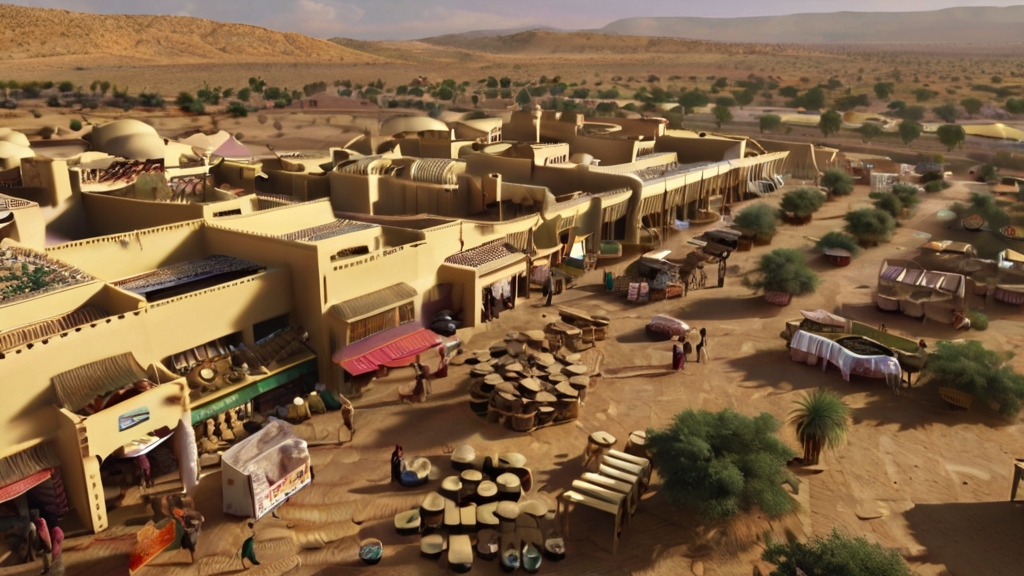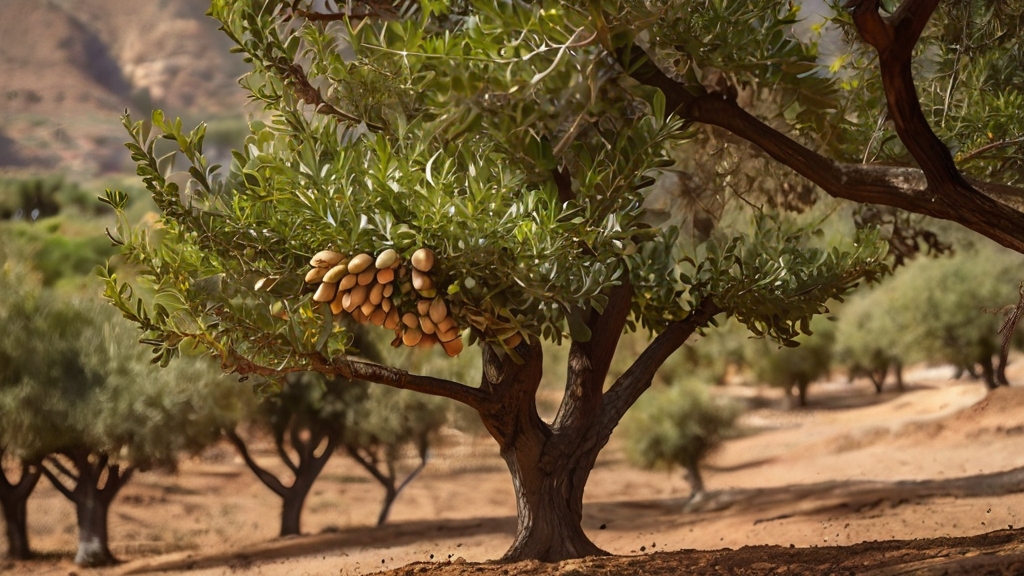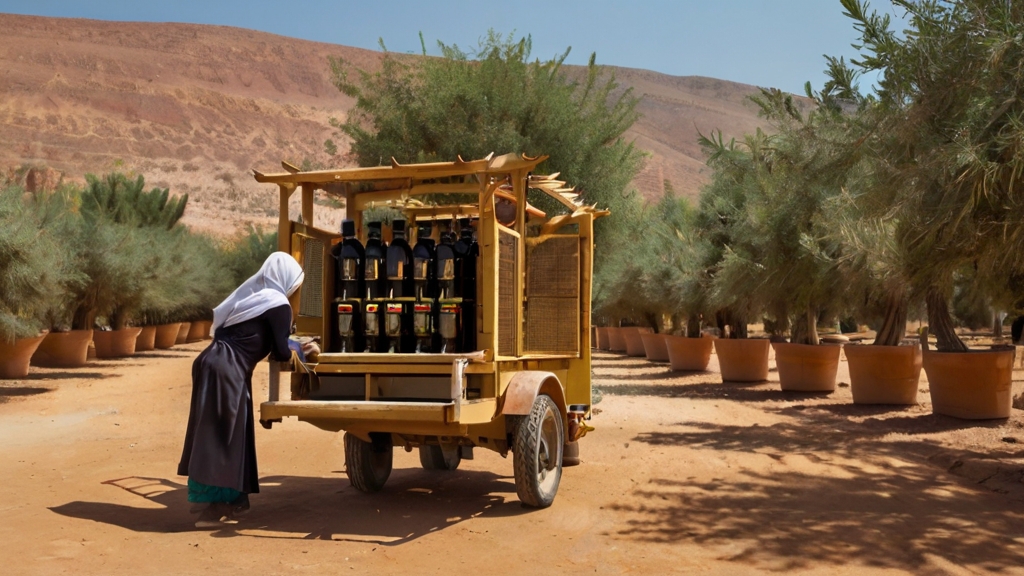
Leila Chaoui
An expert in natural beauty remedies, our author brings a wealth of knowledge and passion for Moroccan Argan Oil, guiding readers on its benefits and versatile uses for radiant skin and hair.
Key Takeaways
Imagine a world where the golden glow of sustainability shines upon the Argan oil trade, illuminating the path towards a brighter future. With a growing demand for this liquid gold, it is imperative to explore the sustainable practices that can preserve the delicate balance between the environment, society, and the economy. From the lush groves of the Argan tree to the hands of empowered women, the journey of sustainable Argan oil trade holds promises of conservation, fairness, and innovation. But how can we ensure that this precious resource continues to thrive? Let us embark on a quest to unravel the secrets of sustainable practices in Argan oil trade.
- Argan oil trade promotes environmental stewardship, fair wages, and economic empowerment for local communities.
- Sustainable harvesting methods and responsible water usage protect the argan forest ecosystem.
- Certifications like ECOCERT Organic and Fair Trade ensure transparency in the supply chain.
- Eco-friendly production processes and waste management strategies minimize the ecological footprint.
Importance of Sustainable Argan Oil Trade

The sustainable trade of argan oil plays a crucial role in promoting environmental stewardship, empowering local communities, and ensuring ethical practices throughout the supply chain. Through sustainable practices, the argan oil industry not only benefits the environment but also supports the well-being of the people involved.
One of the key aspects of sustainable argan oil trade is its commitment to environmental stewardship. By implementing responsible production processes, such as using organic and natural methods, the industry helps preserve biodiversity and protect the delicate ecosystem in which the argan tree thrives. This ensures that future generations can continue to benefit from the natural resources provided by the argan tree.
Moreover, sustainable argan oil trade goes beyond environmental considerations. It also focuses on fair wages and economic empowerment for the local communities involved in the production process. By providing fair compensation and creating job opportunities, the industry helps uplift these communities and improve their quality of life. This not only contributes to poverty reduction but also fosters a sense of pride and self-sufficiency among the local population.
Water conservation is another important aspect of sustainable argan oil trade. The industry recognizes the value of water as a precious resource and implements measures to reduce water consumption during the production process. This not only minimizes the environmental impact but also ensures the availability of water for other essential purposes.
Transparency and certifications play a vital role in sustainable argan oil trade. By providing transparency in the supply chain, consumers can make informed choices and trust that the products they purchase are produced with integrity. Certifications like ECOCERT Organic and Fair Trade further validate the industry’s commitment to sustainability and social responsibility.
Environmental Impact of Argan Oil Production

When exploring the environmental impact of argan oil production, it is important to consider resource conservation and waste management. Sustainable harvesting methods not only protect the argan forest ecosystem but also contribute to the prevention of soil erosion and the preservation of water sources. Additionally, eco-friendly production processes, such as responsible water usage and efficient irrigation methods, further support the conservation of essential resources.
Resource Conservation
Argan oil production implements resource conservation practices to mitigate its environmental impact. Here are three ways in which resource conservation is prioritized in argan oil production:
- Sustainable harvesting methods: Argan trees are carefully harvested to preserve biodiversity and maintain the delicate ecosystem of the region. This ensures the long-term sustainability of the argan oil industry and protects the natural habitat of various species.
- Responsible water usage: Water is a precious resource, and argan oil production takes measures to use it efficiently. By implementing water management strategies, such as drip irrigation systems and rainwater harvesting, essential water resources are preserved and excessive water consumption is minimized.
- Eco-friendly production processes: Argan oil is extracted using cold-pressed methods, which require less energy and produce minimal waste. Additionally, energy-efficient facilities and technologies are utilized to further reduce resource consumption and minimize the carbon footprint of the production process.
Waste Management
To effectively address the environmental impact of argan oil production, waste management strategies play a crucial role in minimizing the industry’s ecological footprint. By implementing sustainable practices and responsible resource utilization, the argan oil industry can reduce waste and contribute to environmental sustainability. One key aspect of waste management in argan oil production is recycling. Argan shells, which are generated as a byproduct, can be repurposed for various purposes, such as fuel or cosmetics. This not only reduces waste but also aligns with eco-friendly initiatives. By recycling argan byproducts, the industry demonstrates its commitment to waste reduction and responsible resource utilization. These practices support the overall goal of minimizing the environmental impact of argan oil production and promoting a more sustainable future.
| Waste Management Strategies | Benefits |
|---|---|
| Recycling argan shells | Reduces waste and supports eco-friendly initiatives |
| Repurposing shells for fuel or cosmetics | Responsible resource utilization and waste reduction |
| Minimizing environmental impact | Supports sustainable practices and a more sustainable future |
Social Sustainability in the Argan Oil Industry

The significant role women play in picking and processing argan oil in Morocco contributes to social sustainability and economic empowerment. Female-operated cooperatives in the argan oil industry empower women through healthcare, education, and environmental projects. Fair wages and cooperative initiatives in argan oil production elevate women’s status in society, fostering social sustainability.
- Women cooperatives: Women in the argan oil industry come together to form cooperatives, allowing them to collectively benefit from the trade. These cooperatives provide a platform for women to share resources, knowledge, and support, leading to improved social sustainability.
- Community development: The involvement of women in the production of argan oil contributes to community development. As women gain economic empowerment, they are able to invest in their communities, fostering sustainable economic growth and development.
- Gender equality: The argan oil industry promotes gender equality by providing opportunities for women to participate in the trade. Through fair wages and cooperative initiatives, women are able to gain economic independence and achieve a more equal standing in society.
In addition to economic empowerment, women in argan cooperatives also benefit from initiatives supporting their healthcare and education. These initiatives not only improve the well-being of women but also contribute to the overall social sustainability of the community. Furthermore, the argan oil industry is involved in environmental projects, promoting sustainable practices and ensuring the long-term viability of argan forests.
Economic Consequences of the Argan Oil Boom

The economic consequences of the argan oil boom are multifaceted and require careful analysis. An economic impact analysis can provide insights into the overall contribution of the industry to local economies, while profit distribution strategies can determine how the benefits are distributed amongst various stakeholders. Additionally, market sustainability measures need to be implemented to ensure the long-term viability and continued growth of the argan oil trade.
Economic Impact Analysis
The economic consequences of the Argan Oil boom in Morocco have had significant implications for the local population, creating opportunities for livelihoods and prosperity. However, it is crucial to analyze the economic impact in order to ensure long-term sustainability.
- Economic Growth: The boom in the Argan Oil trade has contributed to the overall economic growth of Morocco, boosting the country’s GDP and creating employment opportunities for the local population.
- Environmental Threats: Unsustainable practices such as over-farming and deforestation pose significant environmental threats to the region. These practices need to be addressed and regulated to ensure the preservation of the argan tree and its ecosystem.
- Collaboration with local stakeholders: In order to achieve sustainable development in the argan oil trade, collaboration with local stakeholders is essential. This includes involving communities in decision-making processes and ensuring fair and equitable distribution of benefits.
Profit Distribution Strategies
Profit distribution strategies within the argan oil industry have significant economic consequences for stakeholders involved. Local cooperatives play a vital role in ensuring fair profit sharing and supporting community development. However, challenges arise in achieving equitable profit distribution, particularly impacting the economic viability of women in argan oil production. Transparent mechanisms for profit distribution are essential for maintaining sustainability and social responsibility in the industry. By implementing effective profit distribution strategies, economic stability can be enhanced, women can be empowered, and long-term industry viability can be fostered.
| Key Stakeholders | Profit Distribution Strategies | Economic Consequences |
|---|---|---|
| Local Cooperatives | Fair profit sharing | Supports community development |
| Women in Production | Challenges in equitable profit sharing | Impacts economic viability |
| Industry as a whole | Transparent mechanisms | Ensures sustainability and social responsibility |
Market Sustainability Measures
To ensure the long-term sustainability of the argan oil industry, it is crucial to implement market sustainability measures that balance economic growth with environmental conservation. Here are three important measures that can contribute to the sustainability of the argan oil industry:
- Promoting sustainable production: Encouraging organic farming practices and fair trade principles can ensure that the production of argan oil is environmentally friendly and socially responsible. This can help protect the local ecosystem and support the livelihoods of indigenous women who play a crucial role in the argan oil industry.
- Collaborating with local communities: Involving local communities in decision-making processes and sharing the benefits of the argan oil trade can contribute to sustainable economic development. This can empower the local population and promote the preservation of the argan forests.
- Implementing water management strategies: As water scarcity is a significant challenge in the argan oil production process, implementing efficient water management practices can help conserve this precious resource. This can ensure the long-term availability of water for both agricultural activities and the local communities.
Fair Trade Initiatives in Argan Oil Trade

Fair trade initiatives in the argan oil trade prioritize fair wages and ethical working conditions for women in cooperatives, promoting gender equality and economic empowerment. These initiatives play a crucial role in empowering women and ensuring their well-being within the argan oil industry. By supporting fair trade practices, consumers can contribute to sustainable development and social responsibility.
Fair trade certifications in argan oil products guarantee that the production process meets ethical standards and benefits local communities. This ensures that women in cooperatives are paid fair wages for their work, enabling them to support themselves and their families. The focus on ethical working conditions also ensures that women are treated with respect and provided a safe working environment.
Promoting gender equality is a key aspect of fair trade initiatives in the argan oil trade. By empowering women economically, these initiatives aim to break down societal barriers and create opportunities for women to thrive. This not only benefits the individual women involved but also contributes to the overall development of the community.
The fair trade model in argan oil trade goes beyond just ensuring fair wages for women. It also creates economic opportunities beyond oil production, fostering holistic well-being in the region. By supporting fair trade practices, consumers can play a part in uplifting local communities and promoting sustainable development.
Reforestation and Conservation Efforts in Argan Oil Production

Reforestation and conservation efforts play a crucial role in ensuring the long-term sustainability of argan oil production. The argan tree nuts, from which argan oil is extracted, are found exclusively in the fragile ecosystem of the Moroccan argan forests. To safeguard this unique habitat, several sustainable practices have been implemented in the argan oil industry:
- Reforestation programs: These initiatives aim to preserve and restore the argan tree forests. By planting new trees, these programs help replenish the population of argan trees, ensuring their long-term survival. Reforestation also aids in preventing soil erosion and enhances the ecosystem’s health.
- Conservation of biodiversity: Sustainable practices in argan oil production focus on maintaining the rich biodiversity of the argan forests. Conservation efforts help protect endangered species and promote the overall ecological balance. This approach not only preserves the natural heritage but also contributes to the sustainability of the argan oil industry.
- Collaborative efforts: To achieve environmental sustainability, various stakeholders including local communities, government agencies, and argan oil producers work together. These collaborative efforts involve sharing knowledge, resources, and best practices. By joining forces, they can implement effective reforestation and conservation strategies, ensuring the long-term viability of the argan oil industry.
Innovations Driving Sustainable Practices in Argan Oil Trade

Innovative practices are driving sustainability in the argan oil trade, ensuring the long-term viability of the industry. One such innovation is the use of cold-pressed extraction methods. This process involves pressing the argan kernels at low temperatures, which helps to retain the oil’s natural properties and nutrients. Cold-pressing also reduces the need for external heat sources, making it an energy-efficient production method.
Environmental consciousness is a key focus in sustainable argan oil production. Water conservation strategies play a crucial role in this effort. Rainwater harvesting and efficient irrigation methods are employed to minimize water usage and preserve this precious natural resource. By implementing these practices, argan oil producers contribute to the overall conservation of the environment.
Certifications such as Vegan, fair trade, and organic play a significant role in promoting sustainable practices in the argan oil trade. These certifications ensure transparency and traceability throughout the production process. ECOCERT Organic and USDA Organic certifications, for example, guarantee compliance with stringent regulations and promote eco-friendly production methods.
Collaboration with indigenous Amazigh women is another innovation driving sustainability in the argan oil trade. These women have traditionally been the primary harvesters of argan fruits and play a vital role in the preservation of argan forests. By empowering and involving them in the production process, the industry not only supports their livelihoods but also contributes to the preservation of biodiversity.
Zero-waste production initiatives are also gaining traction in the argan oil trade. Efforts are being made to utilize all parts of the argan fruit, minimizing waste and maximizing resource efficiency. This commitment to zero-waste production aligns with the industry’s goal of reducing its environmental impact.
Furthermore, striving for carbon neutrality is a driving force behind many sustainable practices in the argan oil trade. Companies are investing in renewable energy sources and implementing energy-efficient technologies to minimize carbon emissions. By prioritizing carbon neutrality, the industry contributes to the global effort to combat climate change.
Frequently Asked Questions
Is Argan Oil Fair Trade?
Yes, argan oil can be fair trade. Fair trade practices ensure ethical sourcing and production, including sustainable harvesting and environmental impact. Certification processes like Fair for Life guarantee worker rights, community empowerment, and social responsibility. By supporting fair trade argan oil, you contribute to economic benefits for local communities and promote consumer awareness. Supply chain transparency is also a key aspect of fair trade, ensuring that the entire process is accountable and sustainable.
Is Argan Oil Vegan & Cruelty Free?
Is argan oil vegan and cruelty-free? Absolutely! When it comes to ethical beauty, argan oil ticks all the boxes. With vegan certification and a commitment to not testing on animals, it’s a guilt-free choice. Ethically sourced and made with natural ingredients, argan oil avoids animal byproducts and supports sustainable farming practices. Plus, with clear cruelty-free labeling and vegan alternatives available, consumers can make informed choices. So rest assured, you can enjoy the benefits of argan oil while staying true to your values.
Which Country Is the Largest Producer of Argan Oil?
Morocco is the largest producer of argan oil, accounting for over 80% of the global supply. Argan oil has numerous benefits, from its uses in skincare and hair care to its culinary applications and traditional Moroccan medicine. The production process involves Moroccan cooperatives, primarily led by women, who play a vital role in ensuring sustainability. Morocco’s commitment to fair trade practices and environmental conservation sets a benchmark in the argan oil industry. However, challenges remain, and ongoing initiatives aim to address them in international markets.
Why Is Argan Oil Only in Morocco?
Argan oil is only found in Morocco due to the unique climatic and soil conditions that are essential for the growth of the argan tree. The traditional knowledge and techniques for argan oil production are concentrated in Morocco, making it the exclusive producer. The argan forest in Morocco covers close to 2.5 million acres, supporting 3.5 million local livelihoods. This concentration of production has allowed the industry to promote fair trade, organic practices, and sustainable development within the country.
Related Articles
Traditional Argan Oil Uses by Natives
Discover the astonishing array of traditional Argan oil uses by natives, from culinary delights to medicinal wonders, that will leave you amazed and craving for more.
Berber Argan Oil Production Techniques
Discover the intricate 'P'rocesses behind Berber Argan oil production, and unravel the secrets to its exclusivity, cultural heritage preservation, and high value.
UV Absorption Rate of Argan Oil
Get ready to uncover the surprising truth about the UV absorption rate of Argan Oil, and how it could revolutionize your sun protection routine.


